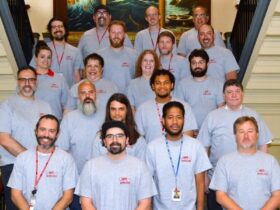To become a computer scientist, a minimum of a bachelor’s degree in computer science or a related field is essential. Further education, like a master’s or PhD, is often necessary for advanced positions.
Pursuing a career as a computer scientist requires a solid foundation in mathematics and a deep understanding of computer theory and practical programming skills. The journey typically commences with obtaining a bachelor’s degree in computer science, which furnishes the cornerstone for developing expertise in software development, algorithms, and complex computer systems.
After this fundamental step, many continue their education to obtain a master’s or doctoral degree, which can open doors to research positions or academic roles. As the digital landscape continually evolves, computer scientists must remain perpetual students, keeping pace with cutting-edge technologies and methodologies. A blend of formal education and ongoing learning distinguishes successful professionals in this field.
The Path To Computer Science
Embarking on a journey toward a career in computer science starts early. Future computer scientists should focus on the right subjects in high school. These courses lay the groundwork for advanced education and a successful career.
Core High School Subjects
A strong high school foundation is key. Focus on subjects like:
- Computer Science to understand the basics
- Mathematics for logical reasoning
- Physics to grasp hardware concepts
- and English for clear communication
These subjects form a stepping stone to higher education.
Importance Of Mathematics And Science
Math and science act as the backbone of computer science education. They help develop problem-solving skills and analytical thinking.
| Subject | Why It’s Important |
|---|---|
| Mathematics | Critical for algorithms and computational theories |
| Physics | Essential for understanding computer hardware |
| Biology | Useful for computational models and bioinformatics |
| Chemistry | Helps in semiconductor studies and nanotechnology |
Pursuing advanced courses in math and science during undergraduate studies is critical. These courses provide the rigor and depth needed in the field.
Higher Education Requirements
Embarking on a journey to become a computer scientist begins with meeting the higher education requirements. Securing a solid foundation through a relevant degree is imperative. This opens doors to various career paths and specializations in this ever-evolving field.
Undergraduate Degree Options
The entry point for a career in computer science typically requires at least a bachelor’s degree. Here are some common undergraduate degree options:
- Bachelor of Science in Computer Science (BSc CS)
- Bachelor of Science in Information Technology
- Bachelor of Engineering in Computer Engineering (BE)
- Bachelor of Science in Software Engineering
These programs cover core subjects such as programming, data structures, algorithms, and computer systems.
Specializations Within Computer Science
As students delve deeper into their computer science studies, they may choose to focus on a particular area. Common specializations include:
| Specialization | Focus Area |
|---|---|
| Artificial Intelligence | Machine learning, robotics, natural language processing |
| Data Science | Data mining, statistical analysis, big data |
| Cybersecurity | Network security, cryptography, ethical hacking |
| Software Development | Web applications, mobile apps, software engineering principles |
Beyond The Bachelor’s Degree
Thinking about a career in computer science? A bachelor’s degree is just the start. To climb higher, consider further education. Specialists with advanced degrees stand out. They lead in innovation, research, and academia. Grasp complex concepts and become a leader in technology. Curious about the next steps? Read on.
Master’s Degree: Advancing Your Knowledge
A Master’s degree in computer science deepens your skills. You’ll study advanced topics like algorithms, computer systems, and software development. Career opportunities widen with a master’s. You could become an expert in AI, cybersecurity, or data analytics. The curriculum often includes:
- Complex computing techniques
- Project management
- Advanced programming languages
Master’s programs often offer specialization options. Choose according to your interests and career goals.
Ph.D. Considerations: Entering Academia Or Research
Ph.D. programs in computer science aim for groundbreaking research. They prepare students to create new knowledge. A Ph.D. is vital for teaching at the university level or leading R&D teams. During a Ph.D., you will:
- Dedicate years to focused research.
- Develop a thesis on a niche topic.
- Contribute original ideas to the field.
Many Ph.D. graduates hold top positions in tech companies. They also play key roles in government or private research labs.
Essential Skills For Computer Scientists
Venturing into the realm of computer science demands a robust set of skills. These essential abilities set the foundation for a successful career. They spur creativity, drive innovation, and solve complex problems. Let’s uncover the vital competencies every aspiring computer scientist needs to master.
Programming Proficiency
The cornerstone of computer science is programming. Mastery here is non-negotiable. Programmers craft the code that powers apps, websites, and software. They must fluently speak and write in programming languages. Common tongues include Python, Java, and C++. It’s about more than just code—it’s about bringing ideas to life. Consider programming as your digital paintbrush, a tool to create tech marvels.
Hands-on experience is the key to proficiency. Work on real projects or contribute to open-source platforms. Build your portfolio to showcase your coding skills. It stands as proof of your expertise. Below is a breakdown of core programming languages you should know:
| Language | Use-case |
|---|---|
| Python | Data Science, Web Development |
| Java | Enterprise Applications, Android Apps |
| C++ | System Programming, Game Development |
Analytical Thinking And Problem-solving
At the core of any tech breakthrough is often an intricate problem in need of a solution. Computer scientists must have the brainpower to dissect complex issues. They use logical reasoning to find effective solutions. They often turn data into insights and concepts into reality.
Building these skills requires a curious mind and a love for puzzles. You must practice thinking systematically and critically. Focus on algorithmic thinking and study different problem-solving strategies. Here’s a list of approaches to enhance analytic abilities:
- Engage with puzzles and logic games
- Participate in coding challenges
- Study case scenarios in depth
- Practice breaking down complex tasks into manageable steps
Developing these skills paves the way for optimizing systems and innovating solutions. Strengthening analytical thinking begins with daily practice and consistent learning.
Industry Certifications
Industry certifications play a key role in advancing a computer scientist’s career. Beyond formal education, certifications can highlight specialized expertise. They often serve as a professional benchmark for specific skills within the tech industry. These credentials can support career growth, ensuring that professionals stand out to potential employers.
Certifications Vs. Degrees
Determining whether to pursue a certification or a degree is a critical decision. Certifications often focus on particular technology or skill set and can be completed in a shorter time frame. Degrees, on the other hand, offer a broad understanding of computer science principles. Both paths have unique benefits and can complement each other in the technology sector.
- Certifications: Short-term, focused on specific skills.
- Degrees: Long-term, comprehensive education.
Popular Certifications For Computer Scientists
Several certifications are recognized and respected across the tech industry. These certifications can give an edge in a competitive job market. Below is a list of some sought-after credentials:
- CompTIA Security+: Validates baseline cybersecurity skills.
- Certified Information Systems Security Professional (CISSP): Demonstrates advanced ability in IT security.
- Microsoft Certified: Azure Fundamentals: Shows knowledge of cloud services and Azure.
- Amazon Web Services (AWS) Certified Solutions Architect: For expertise in designing distributed systems on AWS.
- Google Cloud Certified: Proves skills in Google Cloud technology.
- Certified Data Professional (CDP): Addresses various aspects of data science and data management.
A professional can opt for an individual certification or a combination to best align with career goals.
Real-world Experience
Classrooms teach theories; real-world experience builds expertise. Becoming a computer scientist isn’t just about degrees. Hands-on experience is key. Tech giants and innovative startups offer valuable opportunities to grow. Mentoring through actual projects nurtures problem-solving skills. Those experiences can be found in two main ways: internships and contributions to open source projects. Let’s take a closer look.
Internships In Tech Companies
Internships provide a sneak peek into the tech industry’s day-to-day operations. They are a stepping stone to a successful career. Here’s what internships offer:
- Practical Knowledge: Implement what textbooks teach.
- Professional Networking: Connect with industry leaders.
- Career Guidance: Gain insights on various tech roles.
- Resume Builder: Add experience to stand out.
Scoring an internship at a top tech company often requires:
| Step | Action |
|---|---|
| 1 | Create a solid resume. |
| 2 | Prepare for tech interviews. |
| 3 | Apply early and follow up. |
Contributing To Open Source Projects
Open source projects are a goldmine for budding computer scientists. They allow:
- Collaboration: Work with global teams.
- Skill Enhancement: Improve coding by tackling real-world software issues.
- Portfolio Boost: Show your code to potential employers.
Start contributing by:
- Selecting a project that aligns with your interests.
- Understanding the project’s contribution guidelines.
- Submitting code for review and being open to feedback.
Kickstart your career by diving into real-world tech experiences.
Continuing Education And Lifelong Learning
The journey to becoming a computer scientist doesn’t end with graduation. Technology evolves rapidly. To stay competent in the bustling tech industry, continuing education becomes imperative. Lifelong learning helps computer scientists keep their skills sharp and knowledge current.
Workshops And Online Courses
Professional workshops and online courses offer valuable opportunities to learn new skills. They often cover the latest trends and best practices in computer science. Many renowned universities and private companies provide these courses. Earn certificates to showcase on your resume and LinkedIn profile. Here are some formats you might encounter:
- Video tutorials and live webinars
- Interactive coding bootcamps
- Self-paced online modules
Platforms like Coursera, edX, and Udemy become treasure troves for knowledge seekers. Topics range from artificial intelligence to cybersecurity. Such courses support career advancement and specialization.
Staying Updated With Emerging Technologies
Technological advancements don’t wait. To excel as a computer scientist, you must stay abreast with emerging technologies. This requires a dedicated approach to learning. It involves:
- Subscribing to industry journals and tech news websites
- Following influential figures and organisations on social media
- Attending tech conferences and industry meet-ups
Engage with communities on platforms like GitHub or Stack Overflow. Participate in open-source projects. Network with peers to exchange knowledge. Remember, your skillset is an ever-growing asset. Make a commitment to never stop learning.
Breaking Into The Industry
Deciding to become a computer scientist is thrilling. Yet, breaking into the industry can seem daunting. Fret not, as the right education pairs with action. Let’s explore how a budding computer scientist can make that grand entrance into the tech world.
Building A Portfolio
Showcase your skills with a well-curated portfolio. A strong portfolio can often speak louder than a degree. It’s a practical way to demonstrate your abilities and understanding of computer science principles. Consider these steps:
- Include personal projects that highlight your problem-solving skills.
- Display a variety of work, from coding to software development.
- Document the process of your projects, not just the end result.
- Keep everything organized and easy to navigate.
Remember, your portfolio is an ever-evolving showcase. Update it as you learn and grow.
Networking And Mentorship
Connections can unlock doors to opportunities. Grow your network with professionals and peers alike. Attend relevant meetups, conferences, and workshops. Find a mentor who can guide you on this journey. They can provide invaluable advice and may help you find your first job. Engage in these networking steps:
- Join online forums and groups related to computer science.
- Contribute to open source projects to meet collaborators.
- Use social media to connect with industry leaders.
- Seek out mentorship programs at universities or tech companies.
Cultivating relationships takes time, but it can propel your career forward.
Career Prospects In Computer Science
As technology advances, the field of computer science offers an array of exciting career opportunities. A solid educational background sets the foundation for a rewarding path in this ever-evolving industry. Unique roles exist across different sectors, each with the potential for growth, innovation, and job satisfaction. Understanding the job market trends and industry roles is crucial for aspiring computer scientists.
Job Market Trends
The computer science job market shows no signs of slowing down. Industry demand continues to surge as companies seek skilled professionals. Key trends include a growing emphasis on data security, cloud computing, and artificial intelligence. Salaries remain competitive, reflecting the high value of these skilled positions. Employment in computer science is projected to grow faster than the average for all occupations.
- Emphasis on cybersecurity expertise
- Increasing demand for AI and machine learning skills
- Rapid growth in software development positions
- Expansion of cloud computing services
Exploring Different Industry Roles
Computer science graduates can explore a variety of roles across industries. Opportunities abound in tech firms, healthcare, finance, and even entertainment. Opportunities can vary from developing software to analyzing complex data. Each role requires a unique set of skills and offers a distinct career trajectory.
| Role | Industry | Key Skills |
|---|---|---|
| Software Developer | Technology | Programming, System Analysis |
| Data Scientist | Business/Finance | Data Analytics, Statistical Modeling |
| Systems Analyst | Healthcare | Problem-solving, IT Knowledge |
| Network Engineer | Telecommunications | Network Design, Security |
With a degree in computer science, the potential to innovate and lead in the digital era is vast. Graduates can navigate different paths, be it in a cutting-edge startup or a global corporation. The key is to align education with industry requirements and personal career goals.

Credit: www.simplilearn.com
Frequently Asked Questions For What Education Is Needed To Become A Computer Scientist
What Degrees Do Computer Scientists Need?
Typically, computer scientists need a Bachelor’s degree in Computer Science for entry-level positions. Advanced roles may require a Master’s or Ph. D. in Computer Science or related fields.
Is Coding Experience Necessary For Computer Science?
Yes, coding is essential in computer science. Students usually learn programming languages and practical coding skills as part of their curriculum.
What Subjects Are Crucial In Computer Science Education?
Mathematics, algorithmic principles, data structures, software engineering, and computer theory form the core of computer science education.
How Long Does It Take To Become A Computer Scientist?
Earning a Bachelor’s degree in Computer Science typically takes four years. Further specialization or research with a Master’s or Ph. D. can take 2-6 additional years.
Conclusion
Embarking on a journey to become a computer scientist involves strategic academic planning. A solid foundation typically includes a bachelor’s degree in computer science or a related field, with advanced positions often requiring a master’s or doctoral degree. Remember, practical experience and continual learning are also indispensable in this ever-evolving industry.
Connecting with professionals and staying abreast of technological advancements will propel your career forward. Choose your educational path wisely; your future in computer science awaits.












































Leave a Reply